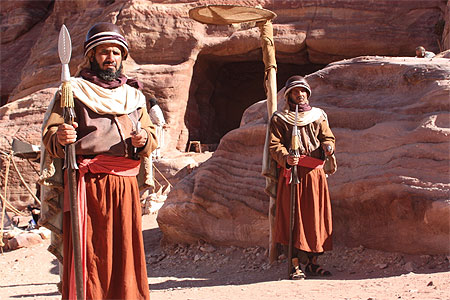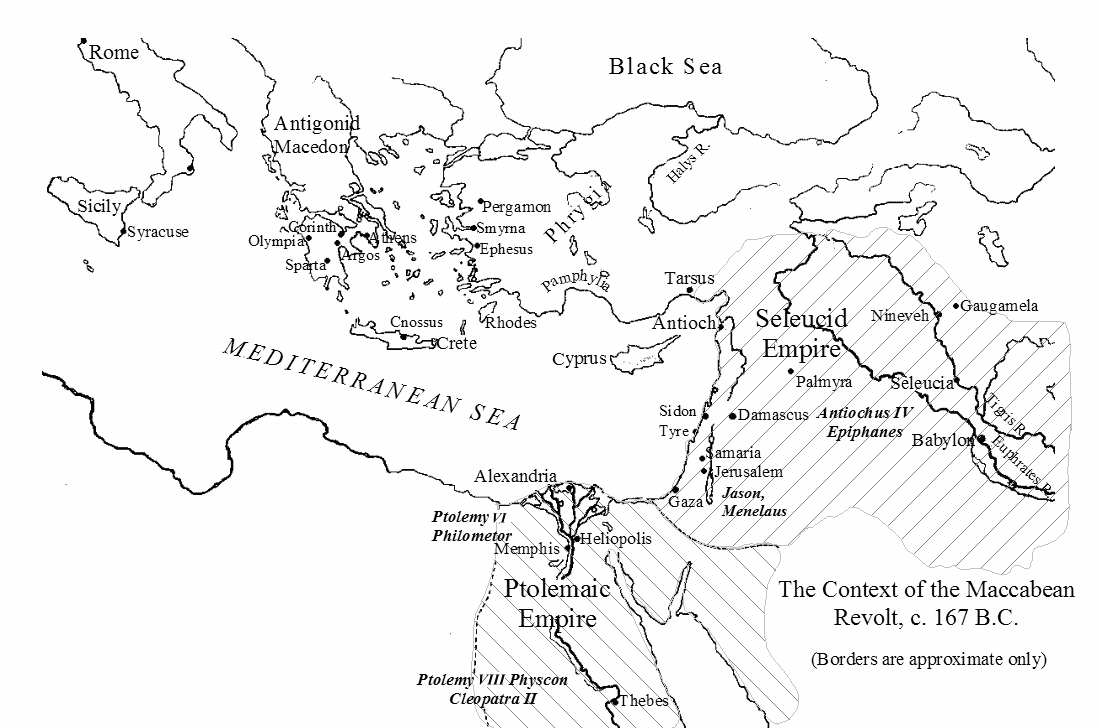Hecatee
Donor
Late in the year 144 of the Seleucid era. Late 168 BCE.
A king, Antiochos IV Epiphanes, wants to uniformize the culture in his kingdom, a shrinking Seleucid realm far from its splendor of some two hundred years before, which he hopes to reinforce.
The current target of his policy is a local culture in the vital southern area of his lands, the Jews. Those strange people believe in a single God, to the exclusion of all others. More importantly, they have close tie with their numerous brethren in Alexandria, capital of the rival Lagid dynasty.
Attempts are made to force those Jews to adore other gods, a statue of Baal Shamin is even carried from Syria to Hierosolima, where Antiochos IV expects it to be honored in the holy temple that crowns this provincial backwater.
The issue is also a question of prestige for Antiochos, who’s recently been forced to turn around from an easy conquest of Egypt and Cyprus by an old roman ambassador and his stick at the same time as his latest tame Jewish High Priest, Menelaus, has been ousted by the former owner of the position, Jason.
The explosion is as fierce as it was unexpected at the royal court. Simultaneously the Seleucid find themselves facing three factions: the Hellenized Jews, split between Jason and Menelaus, and the conservative, traditionalist Jews. Amongst those arises a leader, Judas Maccabee, helped by his numerous brothers. A country is set afire. Everywhere men rise in rebellion against their king, everywhere man fight against his neighbor.
Sending messages to neighboring powers, Judas attempts to mount a coalition against the Seleucid ruler. One of the men he calls upon is the ruler of the Nabateans, Aretas, first of his name. A tribe of desert dwellers, expert horse breeders and traders in rare spices, strange bitumen and precious incense brought from hostile Arabia, they live as nomads although they do have a few stronghold where they hide their families and their most precious goods.
More importantly, they are the only people in the area who ever succeeded in beating a Macedonian army, some one hundred and fifty years before, when they defeated not one but two strong forces sent by Antigonos Monophtalmos and Demetrios Poliorcetos, going as far as killing their general Athenaios.
As the Seleucid forces closes on Hierosolima, the Jewish High Priest Jason flees east, toward the elusive nomads and their king Aretas. He leaves behind men enough to defend the city and keep Menelaus prisoner of the citadel, which his men have not been able to take. He hopes he may convince the king to lend his army of ten thousand men to his own cause, and make him the High Priest of an independent Jewish kingdom. But he knows time is short…
A king, Antiochos IV Epiphanes, wants to uniformize the culture in his kingdom, a shrinking Seleucid realm far from its splendor of some two hundred years before, which he hopes to reinforce.
The current target of his policy is a local culture in the vital southern area of his lands, the Jews. Those strange people believe in a single God, to the exclusion of all others. More importantly, they have close tie with their numerous brethren in Alexandria, capital of the rival Lagid dynasty.
Attempts are made to force those Jews to adore other gods, a statue of Baal Shamin is even carried from Syria to Hierosolima, where Antiochos IV expects it to be honored in the holy temple that crowns this provincial backwater.
The issue is also a question of prestige for Antiochos, who’s recently been forced to turn around from an easy conquest of Egypt and Cyprus by an old roman ambassador and his stick at the same time as his latest tame Jewish High Priest, Menelaus, has been ousted by the former owner of the position, Jason.
The explosion is as fierce as it was unexpected at the royal court. Simultaneously the Seleucid find themselves facing three factions: the Hellenized Jews, split between Jason and Menelaus, and the conservative, traditionalist Jews. Amongst those arises a leader, Judas Maccabee, helped by his numerous brothers. A country is set afire. Everywhere men rise in rebellion against their king, everywhere man fight against his neighbor.
Sending messages to neighboring powers, Judas attempts to mount a coalition against the Seleucid ruler. One of the men he calls upon is the ruler of the Nabateans, Aretas, first of his name. A tribe of desert dwellers, expert horse breeders and traders in rare spices, strange bitumen and precious incense brought from hostile Arabia, they live as nomads although they do have a few stronghold where they hide their families and their most precious goods.
More importantly, they are the only people in the area who ever succeeded in beating a Macedonian army, some one hundred and fifty years before, when they defeated not one but two strong forces sent by Antigonos Monophtalmos and Demetrios Poliorcetos, going as far as killing their general Athenaios.
As the Seleucid forces closes on Hierosolima, the Jewish High Priest Jason flees east, toward the elusive nomads and their king Aretas. He leaves behind men enough to defend the city and keep Menelaus prisoner of the citadel, which his men have not been able to take. He hopes he may convince the king to lend his army of ten thousand men to his own cause, and make him the High Priest of an independent Jewish kingdom. But he knows time is short…


